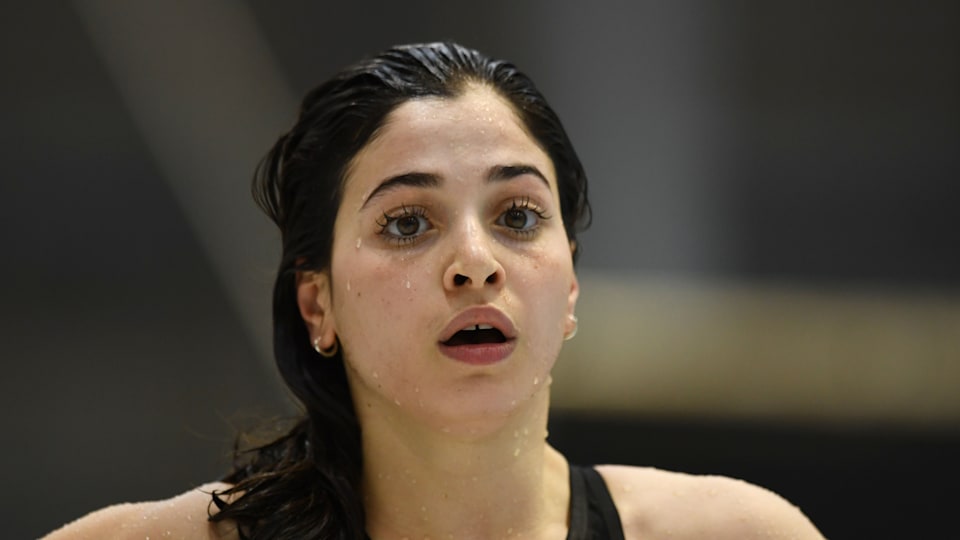Why Yusra Mardini's story should inspire the world
She captured the world's attention with her remarkable story at Rio 2016. Now Mardini is back and her mission is two-fold: to thrill in the pool and to remind everyone of the value of refugees.

Olympic Opening Ceremonies are quite unlike anything else in the world.
It is a moment of welcome, of celebration and of acknowledgement. The home crowd roars in delight knowing the Olympic Games are coming. The athletes applaud the crowd and then each other; they all know what it takes to make a Games.
For refugee athlete Yusra Mardini, when she walked out under the IOC Refugee Olympic Team flag at the Opening Ceremony in Rio 2016 it was quite simply life-changing.
Speaking in conversation with five-time Olympic champion Katie Ledecky on Olympic Day, the 22-year-old swimmer reflected:
“The moment I entered the stadium, that changed the way I think about the word refugee.”
It was the realisation that she was no different to her competitors hailing from countries all around the world. She was standing for a people of her own, people beyond borders.
“I know that I am maybe not carrying my country’s flag but I’m carrying the Olympic flag which represents the whole wide world.”
Mardini will be able to relive the occasion again when she walks out with an even bigger refugee team at Tokyo 2020. She is one of 29 refugee athletes chosen to compete at this summer’s Games.
A second Games will mark another significant achievement in the life of the Syrian whose very survival once depended on her ability to swim.
“Me and my older sister decided because of war we weren’t safe. You went to school sometimes and there were bombings. In the pool there were also bombings."
"It’s like you’re living but there is no further goal in life” - Yusra Mardini
The story of Mardini’s 25-day long voyage captured headlines around the world. It reveals her tremendous courage and tenacity for life:
“We were on a dinghy that was supposed to be for vacation. Only seven people are allowed on it, but we were 20 people. Usually it’s like 10km, so it takes round about 45 minutes in these small dinghies. The boat was already broken somehow and after 15 minutes the motor stopped; it didn’t work anymore.
“My sister jumped in the water from one side, and I jumped from the other side which she wasn’t very happy about. She started screaming at me to go up to the boat even though we were both swimmers.
"After that, two guys also jumped from either side, and we tried with one hand to put it on the rope and then do kicks to stabilise the boat and so on. That took us three hours and a half until we reached the shore.”
Mardini’s journey didn’t end once she made it the island of Lesbos in Greece; that was simply the beginning. She and her family members travelled through a further seven countries before arriving in Germany where she now resides.
While attention during the Games will be on whether Mardini can improve on her 2016 swim which saw her win her butterfly heat, the Syrian refugee’s cause is far greater than any found in the pool.
Her personal mission is to help others better understand the plight of refugees; that ultimately all they are seeking is safety and opportunity.
“This is always something I’m working on telling people.
“I was a swimmer since I was three years old, it’s something I’ve been working on my whole life. It didn’t just come to me when I came to Germany. It’s just that in Syria, I didn’t have the opportunity. I didn’t have the support of the federation.”
Such is the power of Mardini's will to inspire all who listen, Team USA’s Ledecky responded to the young Syrian athlete by sharing part of her own family history.
Ledecky’s paternal grandfather, Jaromir, was from Czechoslovakia which has since split into the Czech Republic and Slovakia. He received an academic scholarship to study in the United States in 1947 but was urged by family to stay there and defect rather than return to the communist country they said was unsafe.
She said, “I have so much respect for what he accomplished in his life and the hard times that he faced along the way. I think a lot of that has formed my feelings towards immigrants and refugees and the challenges you face.
"Everyone has dreams. Everyone has goals. When you can’t pursue those goals to the fullest you have to first look out for your safety and your family’s safety and then, two, try to continue to pursue your goals."
Touched by Ledecky’s story, Mardini agreed: “I'm like, 'He’s a refugee. Even though he had a hard story, he’s still working on his dream! So you should respect that.'”
It’s no small thing that Mardini, who once watched Ledecky swim on her television screen in Syria at the urgings of her dad, is now her peer. Such is the transformative power of the IOC Refugee Olympic team and the message of solidarity that it inspires.
Mardini will hope that her message her return to the Olympic arena will once again mean her message is heard in harmony with the buzz and excitement of this summer’s Games.
